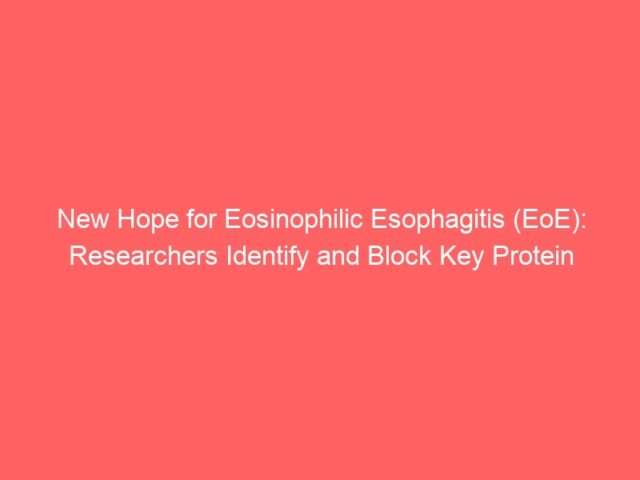TAU researchers discovered that blocking the protein TSLP could stop a painful, meals allergy–pushed illness on the rise worldwide
A brand new research from the Grey College of Medical and Well being Sciences at Tel Aviv College could mark a breakthrough within the therapy of Eosinophilic Esophagitis (EoE) — a continual inflammatory illness of the esophagus attributable to meals allergic reactions. EoE results in issue swallowing, chest and stomach ache, and even development delays in youngsters. Its prevalence has been steadily rising over the previous decade in Israel and the Western world.
On this research, researchers recognized the protein TSLP as a set off for the illness’s improvement, and located that neutralizing it might considerably ease signs.
The research, led by Prof. Ariel Munitz and doctoral pupil Anish Dsilva from the Grey College of Medical and Well being Sciences, was carried out in collaboration with Dr. Chen Varol of Ichilov Hospital, Prof. Marc Rothenberg of Cincinnati Kids’s Hospital, and the pharmaceutical firm AstraZeneca. It was supported by grants from the Israel Science Basis, the US-Israel Binational Science Basis, and the Azrieli Basis Canada–Israel. The article was revealed in Allergy, the main journal in scientific immunology.
Understanding the Illness
Prof. Munitz explains: “Eosinophilic Esophagitis, or EoE, is a kind of meals allergy. It’s a continual irritation of the esophagus attributable to an irregular immune response to meals — primarily milk, eggs, wheat, nuts, fish, and extra. The illness is characterised by an accumulation of eosinophils, a kind of white blood cell that’s not sometimes current in a wholesome esophagus. EoE is usually related to different allergic circumstances resembling bronchial asthma and atopic dermatitis. It causes issue swallowing, meals getting caught within the esophagus, chest and stomach ache, and development delays in youngsters. Present therapies require restrictive diets, and in extreme circumstances, sufferers depend on important amino acid formulation. Over the previous decade, there was a regarding rise within the prevalence of EoE worldwide, together with in Israel. We’re learning the illness in depth to grasp the involvement of assorted immune system parts in its development. These parts could function targets for future therapy for this illness, and for different allergic problems as effectively.”
A earlier research from Prof. Munitz’s lab, additionally revealed in Allergy, introduced an experimental mannequin that intently mimics the course and signs of EoE in people. As a direct continuation of that research, the researchers now targeted on a selected side of the illness, aiming to grasp the function of epithelial cells. Prof. Munitz elaborates: “Epithelial cells kind a protecting outer layer that stops international our bodies from coming into organs, together with the digestive and respiratory techniques. In allergic circumstances, epithelial cells launch varied substances in response to encountering an allergen, and these substances set off the chain of occasions that provoke the inflammatory course of we expertise as an allergy assault.”
TSLP: The Central Participant
The researchers discovered that epithelial cells within the esophagus of the EoE experimental mannequin secreted excessive ranges of two proteins: IL-33 and TSLP. In addition they found that the esophageal tissue contained immune cells with receptors for each proteins, indicating that these are lively proteins able to initiating the illness.
They then examined whether or not every protein had a definite function or acted collectively. Utilizing genetic engineering, they created fashions missing one of many proteins.
The outcomes had been clear: eradicating IL-33 didn’t change the illness course, however eradicating TSLP led to a dramatic enchancment — in some circumstances stopping the illness fully. Equally, neutralizing TSLP with an antibody prompted a major discount in signs. Sequencing and bioinformatic analyses confirmed that TSLP acts as a grasp regulator of EoE, making it a promising therapeutic goal.
Prof. Munitz concludes: “On this research, we discovered that the TSLP protein is a central participant in EoE — a illness that causes important struggling and is changing into more and more prevalent worldwide. We all know that pharmaceutical corporations are presently creating quite a lot of antibodies focusing on disease-causing proteins, below the broad class of organic therapies, together with antibodies towards TSLP. We imagine these antibodies might function an efficient therapy for EoE.”













